In many ways it was a typical opening day at Augusta National, writes Golf Australia's Steve Keipert, as the field experienced a diverse range of fortunes.
BY STEVE KEIPERT AT AUGUSTA NATIONAL
IT’S unlikely there will be an 18-under par score this year, although the man who reached that record-equalling score in victory a year ago may well leave town wearing the green jacket again.
Augusta National is fast becoming a touchstone for Jordan Spieth as the 22-year-old defending champion opened with a six-under 66 to continue to hold the Masters lead he carried all four days in 2015. On a fluky, breezy day that made scoring difficult for the 89-player field, Spieth’s score might not match his epic eight-under 64 from the first day a year ago, but in many ways it was a superior round given the conditions and for the manner in which the Texan remained poised and patient.
Only eight players broke 70 as the breeze blew from the west, always the toughest wind direction at Augusta, and gusted and swirled amid the Georgia pines. Choosing clubs and executing shots with a ball flight to match became chancy acts.
 Jordan Spieth with caddie Michael Greller after another artistic escape. Spieth’s round ebbed and flowed but never saw a dropped shot on a windy Thursday at Augusta National.
Jordan Spieth with caddie Michael Greller after another artistic escape. Spieth’s round ebbed and flowed but never saw a dropped shot on a windy Thursday at Augusta National.PHOTO: Andrew Redington/Getty Images
All told, it was six birdies against no bogeys as Spieth leads Danny Lee and Shane Lowry by two shots. He’s 24-under for his past five rounds at the Masters and 29-under for all nine competitive rounds here in his young career. He’s yet to shoot worse than 72, but said he’d have gleefully taken a 70 standing on the 1st tee this morning in the blustery conditions.
“Yeah, I would have signed for two‑under today and not even played the round, knowing the conditions that were coming up,” Spieth said. “I got a lot out of the round with what I felt like was kind of average‑ish ball‑striking. Just scored extremely well, which is something I’ve been struggling with this season.”
Maybe credit the wind, but there was a distinctly European flavour below Spieth on the leaderboard. Lining up behind the American are a handful of Englishmen, two Irishmen, a Spaniard and a Dane. Then for the antipodeans, Lee’s 68 makes him the first New Zealander since Frank Nobilo, who finished fourth in 1996, to sit inside the top-five after any round of the Masters. After the round he called it one of the top-five rounds of his career.
“It is tough out there,” Lee added. “It’s blowing 25 miles per hour all day. There’s a lot of times, it felt like 50 miles per hour; there’s a lot of gusts. It’s very hard to commit to the line on the putting green, because the wind was blowing so hard. And I was just really trying to focus on my routine and I did a great job today.”
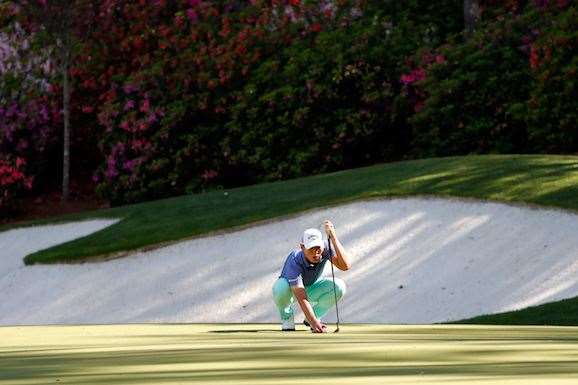 Kiwi Danny Lee did a superb job of negating the windy conditions – and putting well.
Kiwi Danny Lee did a superb job of negating the windy conditions – and putting well.PHOTO: Kevin C. Cox/Getty Images
Lowry missed the cut last year in his Masters debut but drew a great deal of confidence from beating the best in the world at the WGC–Bridgestone Invitational in Ohio last August. So his presence on the leaderboard is superficially surprising but in reality not. His four straight birdies from the 2nd hole set the tone.
MASTERS LEADERBOARD | DAY TWO TEE-TIMES
The last man to tee off on day one, Rory McIlroy echoed the leader’s sentiments that 70 would be a great score in the wind – the difference being that that’s the number the Ulsterman shot. McIlroy made his presence felt with an eagle from 12 feet at the par-5 13th to climb to three-under. The man seeking to become the sixth player in history to achieve the career Grand Slam if he can snare a green jacket looked like he played in cruise control until two late stumbles. McIlroy three-putted the 16th and plugged his approach to 18 in the greenside bunker to lose another stroke.
A trio of Englishmen with history at Augusta – Justin Rose, Paul Casey and Ian Poulter – shot 69 to be well positioned. None returned a scorecard as squeaky clean as Spieth but all three made the requisite number of birdies to feel satisfied. But it is Spieth who put all the pieces of this particular puzzle together.
“I feel like my game’s been trending in the right direction, I just haven’t gotten scores out of how I felt I’d been playing. That normally just comes down to putting. I certainly made a lot of putts today. If I can kind of straighten things out with the iron play, hopefully we’ll be in business. But, yeah, I am extremely pleased with that round today. I felt like we stole a few.”
More like grand larceny. Spieth was at his mercurial best around Augusta. David Feherty once said that watching Phil Mickelson play golf is like watching a child chasing a bobbing balloon along a cliff edge. Well, at Augusta, Spieth’s opening round took on similar teetering proportions. He found plenty of trouble but escaped in ways that would make Harry Houdini and Seve Ballesteros proud.
At the 1st hole he missed both fairway and green before chipping the ball stone dead. At the par-3 4th, he flared his 6-iron tee shot from the forward tee way right and saved par with a deft pitch. After birdies at the 3rd and 6th and 8th to reach three-under, Spieth pulled his drive on 10 left and into a part of the course long viewed as a no-go zone. But his ball glanced trees, finished just off the fairway and he struck a mid-iron that bounced up the hill fronting the green rather than retreating down the slope, finishing ten feet away for another gain at a hole he birdied three times last year.
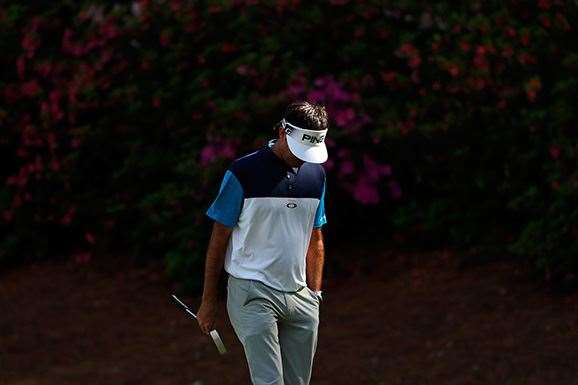 Two-time Masters Champion Bubba Watson narrowly misses his eagle putt at the 13th. PHOTO: Kevin C. Cox/Getty Images.
Two-time Masters Champion Bubba Watson narrowly misses his eagle putt at the 13th. PHOTO: Kevin C. Cox/Getty Images.At the 11th, having this time speared a drive right, his caddie Michael Greller tried to talk him out of a risky shot through the trees towards the green, but the player overruled the bagman. Spieth’s escape shot with a 4-iron from the trees and pinestraw was inches from finding the greenside pond. The ball stayed up and Spieth saved par to stay four-under. After moving to five-under by nearly eagling 13, he wafted his tee shot at the 16th further right than almost anyone has ever seen yet still saved par from 12 feet to keep a clean card.
Which is not to denigrate Spieth nor label him lucky. Rather, he chances his arm when he sees a window to do so and has the temerity to pull off the daring shot – which is precisely what Augusta National wants players to do. Indeed, that intangible quality and sheer golfing resilience is Spieth’s most endearing trait. There’s no question he uses any good luck to patch-up any so-so rounds. Put that down to an innate comfort level with this course that other Masters champions also draw upon.
THE AUSSIES: A DAY OF LOST OPPORTUNITIES
“I enjoy this tournament more than anywhere else,” Spieth said. “It’s easy for us. We don’t have any or many distractions in our preparation and we enjoy that you’re able to kind of feel like you get enough done and you have enough time to do everything, and I think that’s useful when we start.”
Others didn’t experience such initial joy. One of the pre-tournament favourites, the major-less Rickie Fowler, turned at even-par after recovering from a double-bogey at the 1st hole. He then imploded with an inward 44 to shoot 80. His second nine included a triple-bogey eight at the 13th and another visit to the water in carding a double at the par-3 16th. Fowler can now start eyeing the US Open in June to break his major duck.
Likewise, two-time winner Bubba Watson sat three-under after eight holes but three-putted the 9th and whacked it all over Georgia on the inward nine to plummet to three-over. He wasn’t even the best Watson on Thursday as Tom opened with a two-over 74 in his final Masters appearance.
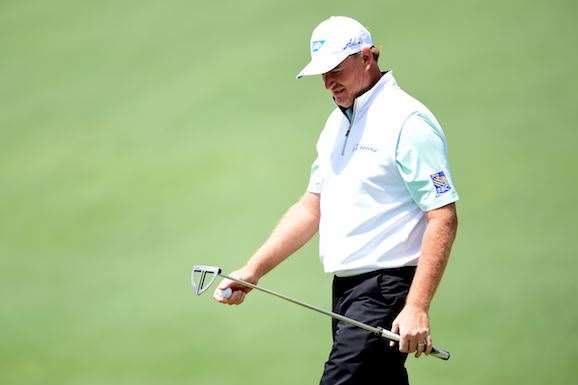 Ernie Els yipped multiple times on the 1st green, six-putting for a disastrous nine at the opening hole. PHOTO: Harry How/Getty Images
Ernie Els yipped multiple times on the 1st green, six-putting for a disastrous nine at the opening hole. PHOTO: Harry How/Getty ImagesHowever, no one’s Masters began worse than Ernie Els’ campaign. The South African ran up a nine on the opening hole, the worst score ever recorded on the 1st in Masters history. He somehow contrived to six-putt with each blow coming from inside three feet and most not even touching the cup in what was a yippy putter’s worst nightmare. Els three-putted the 2nd green, later holed a 38-footer for birdie at the 5th and ended up with an 80. But that beginning will be hard to forget and as sad as it is to say, it was the kind of manic few moments that can end careers.
All in all, it was a typical Masters round. There were chances and calamities with some players able to survive tricky conditions and others left perplexed by them. The weather forecast for Friday is similar so the leaders will be hoping they can replicate their day-one work, while the pursuers will be hoping they don’t.
SEEN & HEARD
* LAST man into the field and first off the tee on Thursday was Shell Houston Open winner Jim Herman. He picked up where he left off last week by birdieing his first two holes on day one of the Masters. Reality hit quickly, though, as Herman bogeyed the 4th, 5th and 6th in shooting an opening 75.
* ABOUT 100 metres short of the 2nd green in the right rough is a vent for Augusta National’s sub-air system that controls moisture levels in the turf. It’s a loud vent, embedded in the ground, and pumps a subway-like jet of air up to the surface. This morning, two boys – perhaps 11 years old and wearing loose tracksuit pants – tried to achieve ‘lift off’ by standing on the grid. One got a rude shock when his pants inflated, MC Hammer-style. They quickly retreated and moved on.
* STANDING beside the 9th fairway, a gust of wind blew a patron’s hat off his head and inside the roped-off area. Faced with a dilemma about how to retrieve it, the gent looked around before deciding to nip under the rope and scamper the three metres or so to grab it. It’s a good choice as the marshals either didn’t notice his transgression or chose to ignore it.
* FOR most of the day, it was thought Ernie Els’ had made a shattering double-figure score at the 1st hole, as a ten registered on the electronic scoreboard in the media centre that was corrected after his round to a nine. A few writers pondered whether the people who operate the manual scoreboard would be equipped for such a score. No problem, they were, as a ‘10’ appeared next to Els’ name soon after. I enquired how many magnetic 10s were in their collection of numbers and learned there are at least a dozen. Next question: which number does the collection go to? Well, 13 is the worst single-hole score ever made at the Masters and let’s just say the scoreboard team is prepared for a re-occurrence.
* YOUR correspondent spent time this morning watching the play at the always-intriguing and underrated par-5 2nd hole. A favourable wind and generous pin position meant it yielded several eagles in the opening round, but I was more impressed by the way No.2 offers a snapshot of the total strategy required to conquer Augusta National. Australia’s Marc Leishman turned his drive perfectly around the corner of the downhill dogleg-left fairway but from there missed his second shot right of the right-hand greenside bunker, which with the right-side flag and downwind pitch, meant he bailed long with this third shot and settled for par. Moments later, Masters debutant Kevin Kisner fired a long-range second shot from well behind where Leishman drove to that landed in the ideal place on the narrow front section of the green and rolled up close enough to make eagle. Augusta’s magnificence as a golf course stems from the way it allows you to attack after a good shot and forces you to defend after a poor one. That back-and-forth parrying with the layout is an enormous part of its complexity and charm.
Related Articles
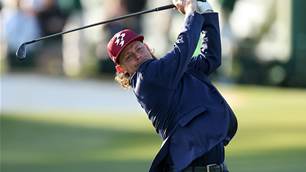
Tips are in! Experts predict Masters winners, long-shots and no-hopers
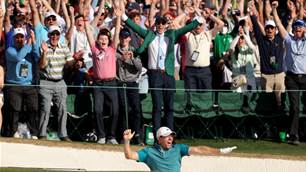
Head, heart and elbow, it's Rory's Masters













